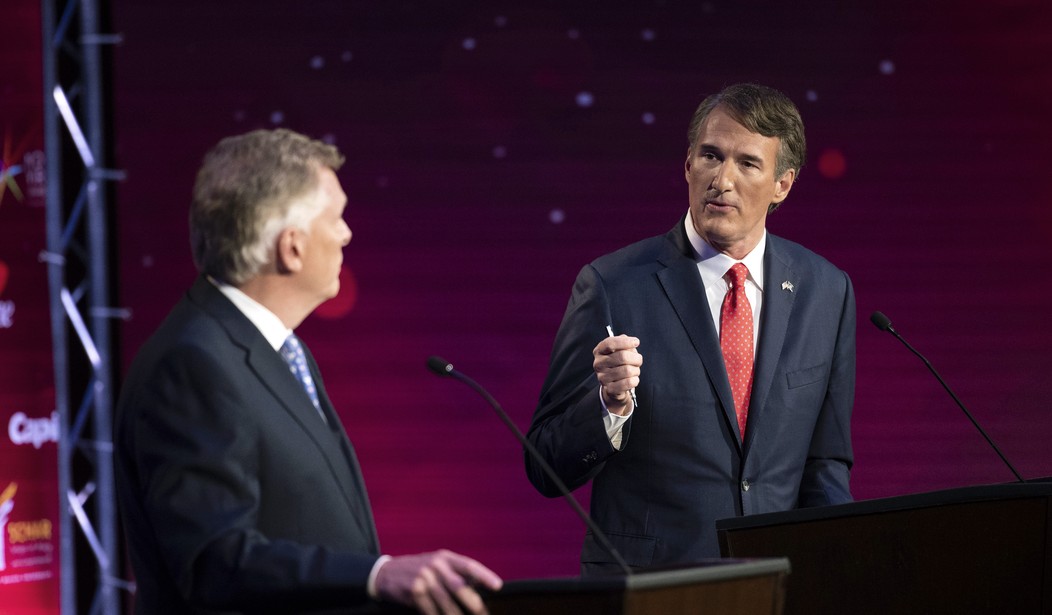Less than a month until Election Day, Virginia’s gubernatorial race is one to watch.
Yes, there’s an actual opening for Republicans to retake state government this year after consecutive losses in 2013 and 2017, respectively. Why? Polls now show a tight contest. And it’s clear former Governor Terry McAuliffe is faltering. Badly.
Here are three issues that could tilt the election in the GOP’s favor next month.
School Choice
During last week’s gubernatorial debate at George Mason University, Glenn Youngkin and Terry McAuliffe clashed on education.
Recommended
Perhaps the most memorable moment from the exchange came when McAuliffe remarked, “I don’t think parents should be telling schools what they should teach.”
Cringe.
His statement was so bizarre, it reverberated inside—and outside of— Virginia. Fox News host Dana Perino called the Clintonite’s answer a “game-changer” in the election:
Well, I would say that what Terry McAuliffe committed last night was a gaffe that is a genuine game-changer for the race. On average, he's up about four points over Youngkin, but talking to some folks down there today and people that are in the suburbs and the exurbs, they're tired of all sorts of things. Education is a top-three issue in that state race right now just because of what happened all summer.
Unbeknownst to T-Mac, Virginia already enshrines parental rights — especially in education — in state law. It reads like this:
§ 1-240.1. Rights of parents.
A parent has a fundamental right to make decisions concerning the upbringing, education, and care of the parent's child.
Youngkin’s campaign immediately converted his viral remarks into an ad.
McAuliffe vetoed school choice legislation several times during his tenure.
And it’s not just Republican and conservative parents sounding the alarm on McAuliffe’s education platform.
Even Democrats in blue Northern Virginia are crossing-over to vote for Youngkin and the rest of the Republican ticket. One Fairfax County parent, a Democrat, wrote a scathing letter-to-the-editor repudiating her party:
This November, I decided to cross the aisle and vote in a direction that I have never seriously entertained before. When I learned the campaign points that Terry McAuliffe and Glenn Youngkin were running on, I instantly made the decision that schools and education would be my #1 priority instead of what political party the candidate was affiliated with.
While conducting research on the candidates, I learned that Youngkin wants to increase academic competitiveness and school choice, while allowing families to make their own choices in regards to education. Terry McAuliffe’s campaign does not clearly showcase a plan to help students besides making a $75 million per year investment to expand internet access to students.
Right-to-Work
Virginia boasts one of the nation’s oldest right-to-work laws. It’s been a longstanding bipartisan policy here. And unsurprisingly, McAuliffe, if elected to another term, intends to revoke it.
How do we know? Well, he recently took in large lump sums of union cash — then flip-flopped. But don’t be fooled: If elected again, McAuliffe will follow through— especially if the General Assembly remains in Democratic control.
“This bill is going to come to his desk, and Terry McAuliffe will sign it. He said that, and the minute he said he would sign it, every union in America endorsed him,” Youngkin said. “It will be the death blow for Virginia’s business climate. This is why every business organization in Virginia that has offered an endorsement so far has given it to me. Not to you, Terry, but to me.”
As I recently noted in Virginian Pilot, revoking right-to-work will undermine our state’s pro-business climate:
The Virginia Economic Development Partnership, a state agency tasked with promoting and attracting business here, warned that repealing right-to-work would adversely impact 260 potential manufacturing and supply-chain projects, jeopardizing 33,000 new jobs and $16.7 billion in capital investment. Their assessment also revealed the state would lose “approximately $8 million-$26 million in state general fund revenue per year.”
Virginia’s 3.1 million non-unionized workers, including those in blue Northern Virginia, aren’t too keen about emboldening unions further.
A recent NOVA Chamber of Commerce poll found “61 percent of Virginia voters, including 52 percent of Democratic voters, think unions should have the same or less influence” and “nearly early eight out of 10 (72 percent) voters are concerned about repealing Virginia’s right-to-work protections for workers and forcing them to pay union dues or risk losing their job.”
Energy
During the first gubernatorial debate down in Grundy, Glenn Youngkin discussed his opposition to the Virginia Clean Economy Act (VCEA) — Virginia’s “Green New Deal.”
It mandates transitioning to solar and wind, under the guise of going “carbon-free,” despite renewable energy sources not actually powering the state.
Per available U.S. Energy Information Agency (EIA) findings, “natural gas fueled 60% of Virginia's electricity net generation, nuclear power provided almost 30%, renewable resources, primarily biomass, supplied more than 6%, and coal fueled almost 4%.”
The newly-enacted law is estimated to raise energy bills $800 on average —or a whopping 24%.
McAuliffe wants to expand the VCEA—signed into law by Governor Ralph Northam (D-VA) last year.
“We see real challenges in getting to the goals that have been set in the original Virginia Clean Economy Act, and my opponent wants to accelerate them and destabilize our entire energy grid,” Youngkin said of the VCEA.
Conclusion
All eyes are on Virginia. As goes the Commonwealth, so goes the country.
There’s an opportunity for Republicans to seize upon Biden’s growing unpopularity here in the state—including high unfavorables among independents and suburbanites. And yes, our state can be a bellwether going into 2022.
I’ll do my part, and hope you do yours too!

























